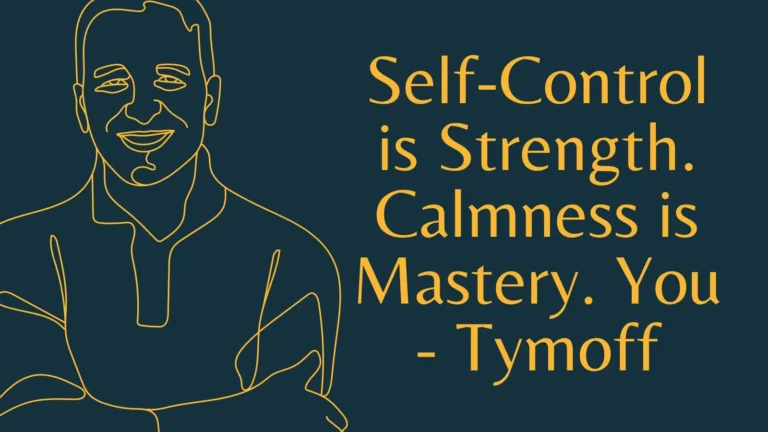Understanding Self-Control as a Form of Strength
Self-control is an essential aspect of personal development, often regarded as a vital strength that allows individuals to navigate the complexities of life effectively. At its core, self-control refers to the ability to regulate one’s emotions, thoughts, and behaviors in the face of temptations and impulses. Unlike sheer willpower, which can be fleeting and inconsistent, self-control embodies a more comprehensive capacity for long-term goal achievement and emotional stability.
Self-control involves a conscious decision-making process that prioritizes long-term success over immediate gratification. For example, a student exercising self-control may choose to study for an upcoming exam rather than engage in social activities, understanding that discipline today will lead to positive outcomes tomorrow. This form of strength enables individuals to resist distractions and remain focused on their objectives, ultimately leading to a more fulfilling life.
Daily life presents numerous scenarios where self-control manifests. Consider a person attempting to maintain a healthy lifestyle. They may encounter tempting food choices that challenge their dietary commitment. Exercising self-control in these moments not only reinforces their strength but also contributes to their emotional well-being. By making choices aligned with their values, individuals cultivate a sense of mastery over their circumstances, further enhancing their self-regulation abilities.
The impact of self-control on decision-making processes is profound. When individuals utilize self-control effectively, their decisions are often more balanced and thoughtful. This leads to a higher likelihood of achieving long-term goals while minimizing emotional distress associated with impulsive choices. Therefore, fostering self-control can significantly improve the overall quality of life, demonstrating that self-control is indeed strength, and calmness is mastery. You – Tymoff, can thrive when you recognize and cultivate this vital attribute within yourself.
The Power of Calmness: Mastering Emotions
Calmness plays a crucial role in the art of self-control and mastery over our emotions. In moments of high stress or uncertainty, maintaining composure can significantly enhance our decision-making abilities. Individuals who can remain calm are often better equipped to analyze situations clearly and resolve conflicts effectively. This emotional steadiness allows for rational thinking, which is particularly important when facing high-pressure challenges. A study conducted by psychologists revealed that participants who practiced calmness exhibited improved problem-solving skills compared to those who were more reactive, emphasizing that self-control is strength and calmness is mastery.
To cultivate this essential trait, several techniques can be employed. Mindfulness, for example, centers on being fully present in the moment, fostering an awareness that decreases anxiety and promotes clarity of thought. Engaging in mindfulness practices, such as meditation or focused breathing, can yield profound benefits. Breathing exercises, specifically, have been shown to help manage stress levels by triggering the body’s relaxation response, which contributes to a more peaceful state of mind. These practices not only enhance emotional stability but also create a foundation for self-control, empowering individuals to remain composed in challenging circumstances.
Anecdotes from various fields provide further insight into the power of calmness. For instance, top athletes often credit their success to the ability to stay calm under pressure, allowing them to perform at their peak. Similarly, professionals in high-stakes environments, such as healthcare or law enforcement, report that maintaining a calm demeanor enables them to tackle complex situations with greater accuracy and focus. By mastering calmness, individuals can cultivate self-control, leading to a significant transformation in how they manage their responses and navigate life’s challenges. In conclusion, the practice of calmness not only enhances personal mastery but also serves as the cornerstone of effective decision-making, reflecting the profound connection between self-control and emotional equilibrium.

The Synergy Between Self-Control and Calmness
Self-control is inherently linked to calmness, creating a powerful synergy that empowers individuals to navigate challenges with resilience. By cultivating self-control, individuals can enhance their ability to remain calm under pressure. This relationship is critical in both personal and professional contexts, enabling individuals to make more deliberate decisions rather than reacting impulsively. For instance, in high-stress work environments, maintaining calmness allows individuals to exercise self-control over their emotions, leading to clearer thinking and more effective problem-solving.
Moreover, calmness contributes to the sturdiness of self-control. When individuals practice mindfulness and relaxation techniques, they create a mental space that allows for greater emotional regulation. In times of crisis, such as facing unexpected obstacles, a calm demeanor helps individuals to refrain from knee-jerk responses, reinforcing their ability to exhibit self-control. This improved emotional balance results in more thoughtful actions and decisions, which are crucial in overcoming adversity.
Practical scenarios illustrate this synergy effectively. For example, consider a manager confronting a difficult situation with a team member. If the manager maintains a calm presence, they can demonstrate self-control by listening attentively and responding constructively instead of reacting defensively. In contrast, losing composure might lead to emotional outbursts, impairing their ability to apply self-control. This interplay of calmness and self-discipline is vital for effective leadership and conflict resolution.
The integration of self-control and calmness allows individuals to cultivate resilience and stability in their daily lives. Emphasizing this synergy not only promotes personal growth but also fosters a harmonious professional environment. By understanding and enhancing the dynamic between these two attributes, individuals can better navigate life’s challenges, ultimately leading to a more balanced and effective approach to various situations.
Cultivating Self-Control and Calmness: Practical Strategies
To effectively cultivate self-control and calmness, individuals can adopt various practical strategies that support their personal growth. The journey towards strong self-discipline and serenity requires a structured approach, and it is essential to set specific, attainable goals. Start by identifying areas where self-control is necessary, such as managing impulses or stress responses. By clearly outlining objectives, individuals create a roadmap to stay focused.
Tracking progress is a vital component in fostering perseverance. Maintaining a journal can be particularly helpful; it allows individuals to reflect on their experiences and note successes and setbacks. This practice not only serves as a diary but also acts as a motivational tool, reminding you of your journey towards self-control being strength and calmness being mastery. Documenting these changes can reveal patterns and provide insights that facilitate further improvement.
Meditation is another powerful strategy that promotes calmness. Establishing a daily meditation routine can help individuals center their thoughts and develop greater awareness of their emotions. This mindfulness practice enhances emotional regulation, encouraging a state of tranquility that supports self-control. Coupled with meditation, arranging one’s environment to minimize distractions can strengthen your focus. For instance, creating a designated space for work or relaxation can promote a calming atmosphere conducive to maintaining control over one’s impulses.
It is crucial to remember that developing these skills takes time and patience. Consistency in applying the chosen strategies is key to seeing lasting changes. As you progress, consider seeking inspiration from insightful quotes and testimonials that resonate with your personal experiences; these can act as gentle reminders of your goal. In conclusion, cultivating self-control and calmness is a journey that requires commitment, practice, and self-reflection. Embrace the process and recognize that every small step contributes to your overall growth.
you may also read
